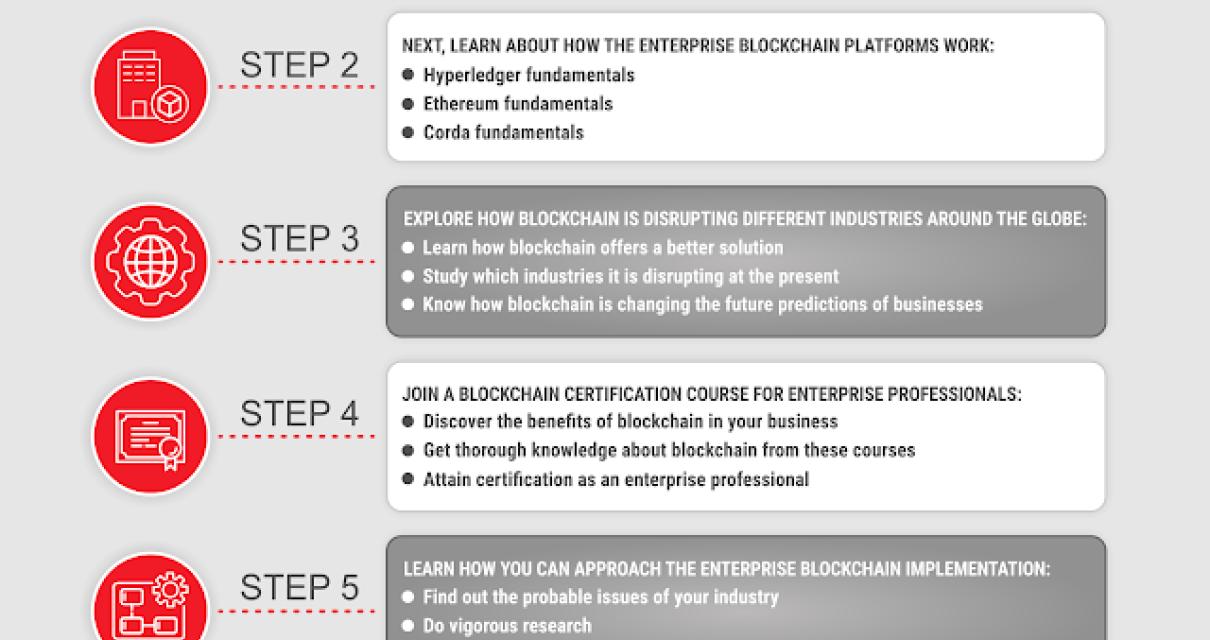Which Blockchain Technology is Right for You?
Choosing the right blockchain technology for your business depends on a number of factors, such as your industry, your needs, and your budget.
Some popular blockchain technologies include:
Bitcoin
Ethereum
Bitcoin Cash
Litecoin
Ripple
NEO
IOTA
Each of these platforms has its own unique features and benefits that can make them a better fit for specific businesses. It’s important to do your homework and assess which blockchain technology is right for your business before making a decision.
A Beginner's Guide to Learning Blockchain Technology
Blockchain technology is one of the most important and disruptive technologies of our time. If you’re new to blockchain, this guide is for you. In this guide, we’ll explain what blockchain is, how it works, and how you can start using it.
What is Blockchain?
Simply put, blockchain is a distributed database that allows for secure, transparent, and tamper-proof transactions. Transactions are verified by network nodes and recorded in a public ledger. Nodes can also use blockchain to create “smart contracts” – self-executing contracts that run on a blockchain network.
How Does Blockchain Work?
When you make a blockchain transaction, your computer contacts a network node to carry out the action. Your computer is responsible for verifying the transaction and adding it to the blockchain. Each time you make a transaction, your computer becomes a node in the blockchain network.
All of this happens automatically and without requiring a third party. This makes blockchain an incredibly secure and efficient technology.
Why Use Blockchain?
There are a number of reasons you might want to use blockchain technology. These include:
Security: Blockchain is incredibly secure because it uses cryptography to protect data.
Transparency: All transactions on a blockchain are publicly visible and unalterable.
Tamper-proof: Because transactions are verified by network nodes, it’s difficult for hackers to tamper with the data.
Efficiency: Because blockchain is decentralized, it’s faster and more efficient than traditional systems.
How Can I Start Using Blockchain?
If you want to start using blockchain technology, you first need to understand how it works. You can learn about blockchain technology by reading articles or watching videos on the subject. Alternatively, you can find a blockchain tutorial or course online.
The Different Types of Blockchain Technology and Their Use Cases
There are three main types of blockchain technology:
1. Distributed ledger technology (DLT)
2. Byzantine fault tolerant blockchain (BFT)
3. Permissioned blockchain
Distributed ledger technology is the most common type. It records transactions across a network of computers. This makes it possible to track the movement of assets and money. DLT is used to create cryptocurrencies, such as Bitcoin.
Byzantine fault tolerant blockchain is a type of DLT that uses multiple nodes to prevent any single point of failure. This makes it more resistant to cyberattacks. BFT is also used to create cryptocurrencies, such as Bitcoin.
Permissioned blockchain is a type of DLT that is restricted to certain participants. This makes it more secure than BFT. It is also used to create cryptocurrencies, such as Bitcoin.
How to Choose the Right Blockchain Technology for Your Project
There are a number of different blockchain technologies available, each with its own set of pros and cons. Before making a decision, it's important to first evaluate your specific needs and goals for your project.
Here are some factors to consider when choosing a blockchain technology:
1. Scalability
One of the main benefits of blockchain technology is its scalability. Compared to traditional databases, blockchain can handle a large number of transactions per second. This makes it a good option for applications that require high throughput, such as payments or digital asset exchange.
2. Security
Another key benefit of blockchain technology is its security. Each block in a blockchain is linked to the previous block, creating a chain of custody that is impossible to tamper with. This makes it a good option for applications that require high security, such as financial transactions or smart contracts.
3. Decentralization
One of the main advantages of blockchain technology is its decentralization. Unlike centralized systems, which are controlled by a single entity or group, blockchain is distributed across a network of nodes. This makes it immune to the whims of centralized administrators and makes it more resistant to attack.
4. Immutability
Another key advantage of blockchain technology is its immutability. Once a block has been added to the blockchain, it cannot be changed or deleted. This makes it ideal for applications that require transparency and trustworthiness, such as digital asset exchange or financial transactions.

The Pros and Cons of Different Blockchain Technologies
When it comes to blockchain technologies, there are pros and cons to each. Here are the main pros and cons of some of the most popular blockchain technologies:
Bitcoin:
Pros:
1) Low cost of transactions: Bitcoin transactions are cheap and fast, making it an ideal platform for online transactions.
2) Decentralized nature: Bitcoin is a decentralized network, meaning that there is no single point of control. This makes it harder for governments or other organizations to interfere with or manipulate the currency.
3) High level of security: Bitcoin is highly secure, meaning that it is difficult for hackers to steal your money.
4) Ability to track funds: Bitcoin allows you to track your funds in a transparent way, which is useful for identity theft prevention.
5) Wide variety of applications: Bitcoin has been used to purchase everything from pizza to cars.
Cons:
1) Volatility: Bitcoin is highly volatile, meaning that its value can change rapidly. This can be a problem if you are trying to invest in the currency, as you may end up losing a lot of money if the price falls.
2) Inability to store value: Bitcoin is not a physical currency, so it does not have the same ability to store value as traditional currencies. This can make it difficult to use it in day-to-day transactions.
3) Limited supply: There will only be 21 million Bitcoin tokens in existence, which means that it will become more difficult to acquire over time.
Ethereum:
Pros:
1) Smart contracts: Ethereum is based on smart contracts, which allow you to make contracts between multiple parties without having to go through a third party. This can be useful for things like paying someone in advance for a service, or exchanging money without involving banks.
2) Ability to run applications: Ethereum can be used to run applications on a decentralized network, which makes it perfect for applications that require high levels of security and privacy.
3) Ability to create custom tokens: Ethereum allows you to create custom tokens that can be used in business transactions. This makes it perfect for developing new types of applications.
4) Wide variety of applications: Ethereum has been used to create applications such as decentralized exchanges, DAOs (decentralized autonomous organizations), and more.
Cons:
1) High fees: Ethereum transactions tend to have high fees, which can make them expensive compared to other platforms.
2) Limited scalability: Ethereum is not as scalable as some other blockchain technologies, meaning that it is not suitable for larger transactions. This could lead to problems in the future if the network becomes too congested.
3) Slow transaction times: Ethereum transactions can take a long time to process, which can be a problem if you need to use the platform for urgent transactions.
What You Need to Know Before Choosing a Blockchain Technology
Provider
When it comes to choosing the right blockchain technology provider, there are a few things you need to know.
First, you should decide what type of blockchain you want to use. There are a variety of different blockchain technologies, each with its own unique benefits and drawbacks.
Second, you should decide which blockchain technology provider is best suited for your needs. There are a variety of providers available, with different pricing structures and capabilities.
Last, you should consider the legal implications of using a blockchain technology provider. Some countries have restrictive laws surrounding blockchain technology, so it's important to research the legal implications of using a particular provider before signing up.

How to Decide Which Blockchain Technology is Right for You
Before you decide which blockchain technology is right for your business, you need to answer a few questions. These questions will help you identify which aspects of the blockchain technology are most important to you and your business.
1. What are your business goals?
Your first step should be to answer this question. What do you hope to achieve with using a blockchain technology? Are you looking to lower costs, increase transparency, or improve security? Once you know this, you can start to compare different blockchain technologies and decide which is best suited for your needs.
2. What are your business needs?
Next, you need to consider your business needs. Do you need a public or private blockchain? How secure do you need your data to be? Do you need to be able to track transactions in real time? Once you have answered these questions, you can begin to compare different blockchain technologies.
3. What are your technical capabilities?
Your next step is to assess your technical capabilities. Do you have the infrastructure in place to support a blockchain technology? Do you have the expertise to build a blockchain application? Once you have answered these questions, you can begin to compare different blockchain technologies.
4. What are your budget constraints?
Finally, consider your budget constraints. Do you have the money to invest in a blockchain technology? Do you need to wait until a new version of a blockchain technology is released? Once you have answered these questions, you can begin to compare different blockchain technologies.